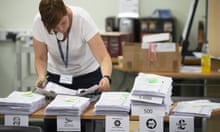The government is facing calls to launch an urgent investigation into the treatment of EU citizens in the European elections after many people reported being denied their democratic right to vote.
Voters across the country told of their devastation at finding their names crossed off the register due to clerical errors by local councils. Experts said the situation was a “scandal we knew was coming” and that the government may have a case to answer in court.
The affected voters said they felt they were being “silenced” as this was the only election they had a right to participate in, being ineligible to vote in the referendum or general elections.
The Labour MP David Lammy said the election system amounted to “ugly discrimination” for people who had endured “three years of being insulted, exploited and asked to apply to stay in their own homes”.
3 years of being insulted, exploited and asked to apply to stay in their own homes.
— David Lammy (@DavidLammy) May 23, 2019
Now reports flooding in that EU citizens are being turned away at polling stations, despite being registered to vote.
The two step process is ugly discrimination #DeniedMyVote https://t.co/w3tzM9blBo
Anneli Howard, a barrister who specialises in EU law, said the government was at risk of being sued. She argued there were multiple breaches of EU treaties, including article 20 of the Treaty on the Functioning of the European Union, which states that EU nationals have “the right to vote … under the same conditions as nationals of that state [of residence]”.
“If EU citizens are being asked to fill out additional forms that UK nationals are not, that’s discrimination,” she said. The treaty had “direct effect”, meaning EU citizens could go straight to court.
While Howard said she doubted any judge would declare the election result unsafe as a result of council clerical errors, the principle of the issue could be established because individuals had the right to sue for compensation.
Claude Moraes, the Labour MEP for London and chair of the justice committee at the European parliament, was due to write to the home secretary, Sajid Javid, on Thursday evening about the “depressing” and “extraordinary disenfranchisement” of voters on an important election for EU citizens.
“The government knew that this was a very sensitive election for them [EU citizens],” said Moraes. “They didn’t have their say in the referendum, they weren’t allowed to vote in the general election and they would have wanted to vote in huge numbers for this election.
“They knew all of this and they should have put in special measures to ensure they could have been registered in time, with extra money for local councils and promotions to tell them what to do.”
TimelineEU elections
Show
European elections – what happens next
7am Polls opened on voting for the European elections across the UK and the Netherlands. Broadcasters now need to be very careful about reporting political news, sticking only to the blandest statements about the fact the elections are happening.
10pm Polls close. There will be no exit poll but some of the parties will have a bit of intelligence about how well or badly they have done, based on whether their supporters have been motivated to vote.
Recess begins, meaning MPs are officially on a break from Westminster until 4 June – which usually limits their ability to plot as they disperse around the country.
Morning: This is the most likely point for the prime minister to make a statement about her future, under pressure from her cabinet, backbenchers and the grassroots.
Afternoon: If no statement is forthcoming, the 1922 Committee will open an envelope containing the results of a secret ballot on whether to allow another motion of no confidence in the prime minister. This is highly likely to lead to a defeat for May, making it probable that she will opt to set out a timetable for her departure at a time of her choosing.
It is polling day in Ireland and the Czech Republic.
Polling is continuing in Malta, Latvia and Slovakia so the results of the UK elections still cannot be revealed.
All other EU countries have their polling days.
10pm: The votes can be published from now on and the first Europe-wide projection will be available soon after this time.
10.30-11pm: North East, South West, Yorkshire and the Humber declarations (based on 2014).
11.30pm Most Scottish results declared (based on 2014).
Midnight: London, East of England, North West, Wales, West Midlands declarations (based on 2014).
12.30am East Midlands declaration (based on 2014).
2am: Most regions will have declared their results by now, so it will be pretty clear how the parties have done. Polls conducted in recent weeks have suggested the Conservatives are set for a dire showing, with Labour also underperforming. The Brexit party is expected to win and the Liberal Democrats and Greens to enjoy a surge in support.
2.30am South East declaration (based on 2014).
Early morning: If May has set out her plans to resign by now, the Conservative leadership candidates are likely to be quick out of the blocks giving their opinions on the elections and setting out how they will turn their party’s fortunes around.
Northern Ireland declaration will be finalised (uses a different system to the rest of the UK).
Moraes said he wanted a “full inquiry into what went wrong” to be conducted swiftly.
Tanja Bueltmann, a historian and prominent citizens rights campaigner, said the election was a scandal that Theresa May “chose not to prevent” despite having been warned several times in the last month about the extra forms EU citizens were being required to submit in order to qualify to vote.
That, she said, “is the worst thing about it all”.
I see that many people are calling #DeniedMyVote an emerging scandal. It's a lot worse than that:
— Prof Tanja Bueltmann (@cliodiaspora) May 23, 2019
- it's a scandal we knew was coming
- it's a scandal @ElectoralCommUK & @theresa_may *chose* not to prevent even though they could have
That is the worst thing about it all.
The Electoral Commission said it would be reviewing the treatment of EU citizens in the election but Moraes said they should have done more to avert the scandal.
The Guardian received more than 500 voting complaints from EU citizens on Thursday, with many more being lodged with the campaign group the3million.
The issue centred on the fact that the UK’s involvement in the elections was confirmed late because of the Brexit crisis and that EU citizens were required to fill in a form called the UC1 or EC6 to declare they would be voting in the UK and not their country of birth.
There were reports of people being told by officials that they should or could vote in their home country, something the civil rights campaigner Gina Miller said reflected a “hostile environment” creeping into the democratic process.
But many of the complaints centred on three clerical errors: councils failing to communicate with EU citizens about a second form; councils not sending out the forms to people who requested them on time; and councils failing to register the forms when they were received.
German nationals Kat Sellner and Moritz Valero said they were shocked when they turned up at their polling station in London to find their names had been “crossed out”, an experience reported by many EU citizens.
“It is unacceptable that this government and the election officers have discriminated against EU citizens,” Valero said. “I will not be silenced and EU citizens will not be silenced.”
Sellner said she had hand-delivered the forms on 2 May to Tower Hamlets council offices, but were told by the election register officer on Thursday that they had only received them on 16 May.
After an inquiry by the Guardian, the council checked the CCTV footage of 2 May and confirmed that Sellner had been telling the truth, and informed them six hours after they went to the polling station that they could vote after all.
A spokesman said: “There was a clerical error and delay between the date that registration forms were delivered to the council and the date the electoral services team received and stamped them.
“We have apologised to the couple for this and made arrangements at the polling station for them to cast their vote.”
Joanna Cherry, a Scottish National party MP who has raised the issue repeatedly, said: “This is good news, but it is also a grave and serious error that people were denied their vote because of a failure in electoral administration.”
A Polish national, Kinga Burger, said: “I went to the polling station today and was turned away and informed about some mysterious form that no one was able to tell me more about. I’m really angry and disappointed I didn’t get to vote.”
Another Polish national, Piotr Klaskala, said: “What I find particularly surprising is that I could see my name and current address on the list in the polling station, which suggests that I have registered successfully, but it was crossed out.”
Another German national complained that she had registered to vote but was not told by her electoral office in Ceredigion that she needed to fill in another form.
“Not even the hint of an apology or explanation from them,” said Cyrine Amor.
Seb Dance, a Labour MEP for London, said he was dismayed at people being denied their vote.
I dismay at the posts under #deniedmyvote - we cannot let fellow citizens’ rights be taken away by an incompetent government.
— Seb Dance MEP 🌹🇪🇺 (@SebDance) May 23, 2019
If you’re an EU27 citizen USE YOUR VOTE and if you’re denied it don’t let it rest.
Two days ago the3million made a formal complaint to the Electoral Commission that EU citizens were being disenfranchised.
Cherry raised the issue in an early-day motion in parliament on Thursday with the Change UK and Labour MPs Mike Gapes and Catherine West, and has vowed to return to it after the recess.
Today I asked @theresa_may to make sure all #EUcitizens living in the UK can vote tomorrow by making the UC1 form available at all polling stations. As PM she could do this but she refused. I wonder why? 🤔 #EUElection2019 #the3millionVote #BrexitChaos pic.twitter.com/S3UUvFnnPO
— Joanna Cherry QC MP (@joannaccherry) May 22, 2019
“I have been shocked, but sadly not surprised, by the reports coming in from across the country of electors being told they cannot take part in today’s vote,” she said.
The Hungarian national Doniya Soni said she was shocked to find she couldn’t vote after enquiring at her local council, Tower Hamlets, about the process and being told she was registered to do so.
Agata Patyna said she was disgusted to be told she should vote in her own country.
Turned away from polling station this morning. Told I should vote in my EU member state. Called local council yesterday, they confirmed I could vote. Called again today. Apparently council had no time to send out forms to all EU residents. Nothing they can do now #DeniedMyVote
— Agata Patyna (@APatyna) May 23, 2019








